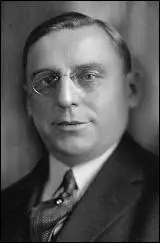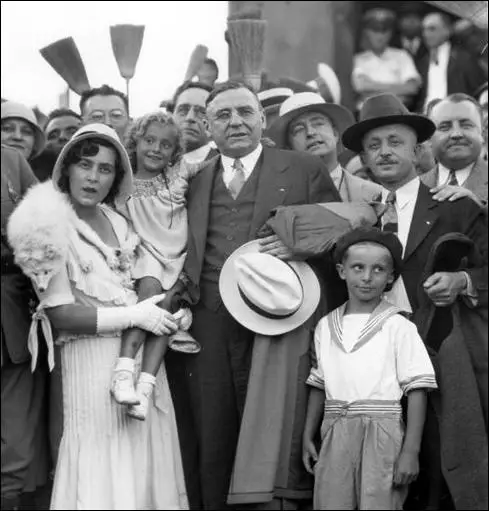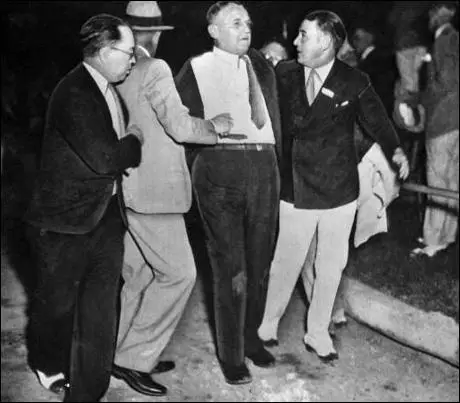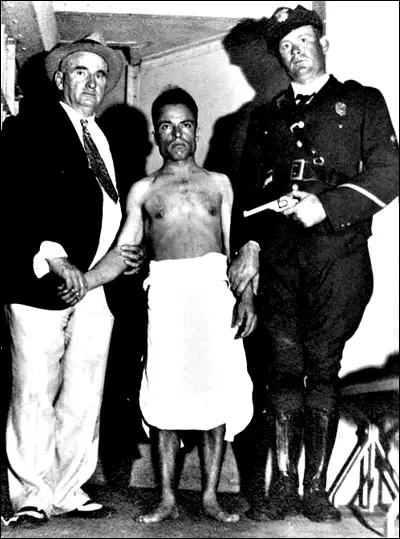Anton Cermak

Anton Cermak was born in Kladno, Austria-Hungary (now Czech Republic), on 9th May, 1873. The following year his parents emigrated to the United States. After six years of formal schooling, Cermak, at the age of twelve, joined his father as a coal miner in Braidwood, Illinois. (1)
Cermak developed a reputation for having strong views and he was selected to be the miner's spokesman in a demand for higher wages. This resulted in him losing his job and he decided to move to Chicago. He found work on the railways before starting his own business selling firewood. With his heavy-set physique and frightening temper he was an imposing man and was considered to have leadership qualities. (2)
Cermak became active in the Democratic Party and in 1902 was elected to the state legislature. Seven years later Cermak became a Chicago City Council alderman. Cermak was able to use his inside knowledge of proposed government land purchase to speculate on real estate. He was also the founder of the Lawndale Building and Loan Association, director of the Lawndale National Bank and a partner in a real estate company Cermak and Serhant. His biographer, Alex Gottfried, claimed that because of his manner, he was popular with voters and seemed to "take pride in his own absence of polish." (3)
Anton Cermak and William Hale Thompson
Cermak became extremely wealthy and soon became leader of the party in the city. His main opponent was William Hale Thompson, the leader of the Republican Party in Chicago, and a man who was a close associate of Al Capone. Cermak maintained a reasonable relationship with Thompson, which allowed him to keep his patronage jobs and influence in the city. Even his enemies agreed that he was a hard-working politician who was "keenly aware of the most intricate details of the issues of the day". (4)
In 1928 Cermak was selected as the Democrat candidate for the Senate. Although he ran a vigorous campaign but was defeated. It was a good year for the Republicans and Herbert Hoover had a landslide victory. Several states that had previously voted Democrat, such as Texas, Florida, Tennessee, Kentucky and Virginia voted Republican for the first time. Al Smith won 40.8% of the vote compared to Hoover's 58.2%. (5)
The Wall Street Crash in 1929 changed the political direction of the country. Cermak created what became known as the "modern Chicago Democratic Machine". It is claimed that Cermak was probably the first politicians to use statistical analysis to evaluate political performance and develop strategy. Members of the different wards were encouraged to compete with each other and success was rewarded with patronage jobs. Paul M. Green has argued that "never before had Chicagoans seen a political party so organized for battle." (6)
Mayor of Chicago
In 1931 Cermak challenged William Hale Thompson, the Republican mayor of Chicago. Cermak accused Thompson of being under the control of Al Capone and other gangsters in the city. He campaigned for social reform and an end to prohibition. Thompson responded by calling Cermak a low-class foreigner. This was a dangerous tactic as at that this time two out of every three Chicagoans was either foreign born or the child of foreign born immigrants. In one speech Cermak commented: "Of course we couldn't all come over on the Mayflower. But I got here as soon as I could." (7)

On 7th April, 1931, Cermak defeated Thompson, by nearly 200,000 votes. This included winning 45 of the city's 50 wards and this gave Cermak the largest victory in Chicago's history. During his time as mayor Cermak spent most of his time dealing with the consequences of the Great Depression. This included cutting services, laying off thousands of workers, and taking away vacation and sick pay from those who remained. To defend his policies Cermak conducted weekly radio talks that he called "intimate chats". (8)
Cermak appointed James Allman as Chief of Police. He had been in the force for 30 years and enjoyed a reputation of being untainted by corruption. Sewell Avery described him as being as "clean as a whistle". The Chicago Crime Commission reported: "During the 12 years that the Chicago Crime Commission has been observing the Police Department there has not come to the notice a single adverse word as to Captain Allman's integrity, ability, efficiency, or independence." Allman was a great success and Chicago's murder rate actually dropped in 1931 and 1932, whereas most other major cities saw their rates rise. (9)
1932 Presidential Election
Cermak attended the 1932 Democratic National Convention, that was held to select the presidential candidate. Cermak favoured Al Smith, mainly because he was opposed to Prohibition. This issue was a problem for Franklin D. Roosevelt because much of his support came from traditionally dry areas in the South and West whereas most party members and the general public favoured repeal. Roosevelt told his supporters to "vote as you wish" and that he would be happy to run on whatever platform the convention adopted. In the vote for repeal 934-213. Arthur Krock reported that "the Democratic party went as wet as the seven seas". (10)
The first ballot showed Roosevelt with 666 votes - more than three times as many as his nearest rival but 104 short of victory. Roosevelt's campaign manager, James Farley, approached Cermak, who controlled most of Illinois delegation, about changing his vote. Cermak refused, because he was aware that if he abandoned the Irish-Catholic candidate, he would have trouble from his supporters in Chicago. (11)
Roosevelt won the nomination on the fourth ballot when he won 945 votes. William E. Leuchtenburg, the author of Franklin D. Roosevelt and the New Deal (1963) summed up the situation that the Democratic Party found itself in: "Liberal Democrats were somewhat uneasy about Roosevelt's reputation as a trimmer, and disturbed by the vagueness of his formulas for recovery, but no other serious candidate had such good claims on progressive support. as governor of New York, he had created the first comprehensive system of unemployment relief, sponsored an extensive program for industrial welfare, and won western progressives by expanding the work Al Smith had begun in conservation and public power." (12)
Anton Cermak campaigned vigorously for Roosevelt in the the 1932 Presidential Election and delivered a 330,000 vote majority in Cook County. The turnout, almost 40 million, was the largest in American history. Roosevelt received 22,825,016 votes to Hoover's 15,758,397. With a 472-59 margin in the Electoral College, he captured every state south and west of Pennsylvania. Roosevelt carried more counties than a presidential candidate had ever won before, including 282 that had never gone Democratic. Of the forty states in Hoover's victory coalition four years before, the President held but six. Hoover received 6 million fewer votes than he had in 1928. The Democrats gained ninety seats in the House of Representatives to give them a large majority (310-117) and won control of the Senate (60-36). (13)
Roosevelt was elected on 8th November, 1932, but the inauguration was not until 4th March, 1933. While he waited to take power, the economic situation became worse. Three years of depression had cut national income in half. Five thousand bank failures had wiped out 9 million savings accounts. By the end of 1932, 15 million workers, one out of every three, had lost their jobs. When the Soviet Union's trade office in New York issued a call for 6,000 skilled workers to go to Russia, more than 100,000 applied. (14)
Assassination of Anton Cermak
Cermak travelled to Miami on 7th February to have a meeting to discuss who was going to be appointed to Roosevelt's government. Cermak did not want a job for himself but was keen to get some of his followers to have good jobs. He also wanted to make sure Chicago got a share of Roosevelt's promised New Deal. Negotiations with James Farley went well and it was arranged that Roosevelt would meet with Cermak on 15th February at Bayfront Park. (15)
Anton Cermak went to the meeting with James Bowler, another senior politician from Chicago. He later recalled: "Mayor Cermak and I had gone to the park twenty minutes before the President elect was due to arrive, and we sat in the band shell together. When Mr. Roosevelt's car came along the President elect saw the mayor and called to him to come down. Mr. Cermak called back that he would wait until after Mr. Roosevelt had made his speech. Then Roosevelt spoke, and he waited until the mayor came down from the platform to go to the side of the automobile." (16)
Roosevelt explained how after the speech "I slid off the back of the car into my seat. Just then Mayor Cermak came forward. I shook hands and talked with him for nearly a minute. Then he moved off around the back of the car. Bob Clark (one of the Secret Servicemen) was standing right behind him to the right. As he moved off a man came forward with a telegram... and started telling me what it contained. While he was talking to me, I was leaning forward to the left side of the car." (17)
At that moment an Italian immigrant, Giuseppe Zangara, pointed his gun at Roosevelt. At the critical moment an alert spectator, Lillian Cross, hit the assassin's arm with her handbag and spoiled his aim. Zangara fired five shots and they all missed Roosevelt, but did hit others. This included Cermak who received a serious wound in the abdomen. Rex Schaeffer, a journalist working for the Brooklyn Daily Eagle reported: "I stood twenty-feet behind the car of the President-elect. Suddenly - I had given my attention to Mr. Roosevelt - a pistol blasted over my shoulder... Four more shots were fired and at the left of the car of Mr. Roosevelt I saw Mr. Cermak slump down." (18)
Zangara was attacked by the crowd. "He was seized by men and women, dragged between the rows of seats, and then a policeman rushed through the crowd and swung on him with his blackjack. The Sherriff of Dade County, Dan Hardie, was on the platform and as the shots rang out he plunged into the crowd after the shooter, and with the policeman, jerked him errect and threw him on the trunk rack of a defective automobile which was carrying one of the wounded out of the park." (19) Another witness remembers shouts of "Kill that man!" and "Don't let him get away". (20)
L. L. Lee was standing next to Cermak when he was shot. He claimed that his only words were, "The president! Get him away!" Lee and W. W. Wood, a Democratic county committee member, grabbed his arms and walked him towards the president's car." The chauffeur decided to get away from the scene as quickly as possible. Lee then heard Roosevelt shout "For God's sake a man has been shot" and the "car jerked to a sudden stop." (21)

Roosevelt told the New York Times: "I called to the chauffeur to stop. He did - about fifteen feet from where we started. The Secret Service man shouted to him to get out of the crowd and he started forward again. I stopped him a second time, this time at the corner of the bandstand, about thirty feet further on. I saw Mayor Cermak being carried. I motioned to have him put in the back of the car... Mayor Cermak was alive but I didn't think he was going to last. I put my left arm around him and my hand on his pulse, but I couldn't find any pulse... For three blocks I believed his heart had stopped. I held him all the way to the hospital and his pulse constantly improved." (22)
After the shooting Roosevelt remained at Jackson Memorial Hospital in Miami until Cermak was brought out of the emergency room. He spoke with him for several minutes and then visited the other shooting victims. According to the New York Tribune, an unnamed witness heard Cermak tell Roosevelt: "I'm glad it was me and not you, Mr. President." (23)

Anton Cermak died three weeks later on 8th March, 1933. Giuseppe Zangara, an unemployed thirty-two-year-old bricklayer, claimed he acted alone. "I have always hated the rich and powerful. I do not hate Mr. Roosevelt personally. I hate all presidents, no matter from what country they come." After being found guilty was sentenced to death in the electric chair at the Florida State Penitentiary. When he heard his sentence he yelled at the judge, "You give me electric chair. I no afraid of that chair! You're one of capitalists. You is crook man too. Put me in electric chair. I no care!" Guiseppe Zangara was executed on 20th March, 1933. (24)
Some political commentators such as Walter Winchell believed that Cermak was the real target. It was argued that Al Capone or William Hale Thompson had hired Zangara to assassinate Cermak. However, Blaise Picchi, the author of The Five Weeks of Giuseppe Zangara: The Man Who Would Assassinate FDR (2003) argued: "Federal agents conducted an exhaustive investigation of the shooting and could not find no link between Zangara and the Chicago mob." (25)
Cermak's biographer, Alex Gottfried, is also convinced that Cermak was not an hired gunman: "What actually seems to be the case, is that, regardless of what connections might have existed between Cermak and Chicago gangdom, the shooting was neither planned by gangsters nor executed by a gangster hireling. The one way ride, the machine gun tattoo, the shotgun blast - these are their customary and foolproof methods. No plot similar to this shooting is recorded in the annals of gang murder." (26)
In 1950 J. Edgar Hoover, the head of the FBI, was asked to report on the original investigation into the case: "The Secret Service files reflected that there were many allegations, most of which were in the form of anonymous letters, that the attempted assassination was planned by gangsters or some organised criminal group, and that Zangara had been sent to Miami expressly for that purpose. Subsequent investigation, however, indicated that he had been in Miami for several months prior to the incident. There is no indication that Zangara had any knowledge as to the identity of Mayor Cermak of Chicago... There was no evidence that Zangara had been in Chicago nor had any relatives or associates in the city." (27)
Primary Sources
(1) John Gunther, Roosevelt in Retrospect (1950)
There is no easy window into the mysteries and paradoxes of Roosevelt, but one outstanding trait, on which almost everybody would agree, is courage. I will not mention for the moment his indomitable conquest of a crippling disability, or even that he cared little for personal safety. After the attempt on his life in Miami in 1933, when Mayor Cermak of Chicago was assassinated, he was the calmest person present. Twice he insisted that his automobile stop in the very middle of the melee, so that he could render Cermak aid. The precautions imposed on him by law, and faithfully executed by a magnificent Secret Service, bored and irritated him. Obviously Mr. Roosevelt was one of those lucky ones who are born without any sense of physical fear, which is the more remarkable because most men without physical fear are unimaginative ; they are likely to be among the least sensitive of the inhabitants of the earth's surface. But FDR was both extremely imaginative and sensitive to a marked degree. Even so, he had no physical fear except about one thing-fire. He hated and feared fire, and this was certainly reasonable enough, because if he were trapped in a sudden fire, his helplessness would have been complete. He was never allowed to travel except with a portable rig handy to get him out of wherever he was if a fire broke out.
(2) Franklin D. Roosevelt, statement in the New York Times (17th February, 1933)
I heard what I thought was a firecracker; then several more... The chauffeur started the car. I looked around and saw Mayor Cermak doubled up... I called to the chauffeur to stop. He did - about fifteen feet from where we started. The Secret Service man shouted to him to get out of the crowd and he started forward again... Mayor Cermak was alive but I didn't think he was going to last. I put my left arm around him and my hand on his pulse, but I couldn't find any pulse... For three blocks I believed his heart had stopped. I held him all the way to the hospital and his pulse constantly improved.
(3) Peter Kendall, The Chicago Tribune (26th March, 2018)
Anton Cermak, who created Chicago's Democratic machine, is shot while talking with the president-elect. Cermak died within a month.
Two notable immigrants stood in the crowd when President-elect Franklin D. Roosevelt emerged from a yacht in Miami on this date after a fishing trip in the Bahamas.One was Chicago Mayor Anton J. Cermak, a Bohemian-born politician who was the master builder of the city's Democratic Party.
The other was Giuseppe Zangara, an Italian immigrant with a ferocious hatred for politicians and their governments.
After a short speech, Roosevelt sat atop the back seat of a convertible and motioned Cermak to his side.
As the two spoke privately, Zangara raised a handgun and began shooting. He was aiming for Roosevelt, but he hit Cermak and four others. The crowd collapsed on Zangara, wrestling the gun from his hands and beating him.
Cermak was helped into Roosevelt's car, which sped to the hospital. During that ride, with Roosevelt at his side, Cermak uttered his famous line: "I am glad it was me instead of you."
Cermak died March 6. Zangara, who laughed when he was sentenced to die, was executed March 20.
Cermak, a man who once sold firewood out of a wagon, had worked his way up the political ranks, beginning in 1902 when he was elected to the legislature. He went on to win posts as alderman, municipal bailiff and Cook County Board president.
In 1931, he was elected Chicago's 36th mayor, defeating scandal-plagued Republican William Hale "Big Bill" Thompson and establishing a Democratic stranglehold on the mayor's office.
Cermak built the strength of the Democratic Party by bringing together diverse factions, using clout and patronage to punish and reward. He could be ruthless, but also conciliatory.
His rewards, it is widely held, came from real estate deals and bootlegging.
While Cermak was in the hospital after the shooting, the Tribune wrote: "We think he faced his problems courageously and did the best that was in him to put this punch drunk city back on its feet, to restore its reputation in the eyes of the world, to re-establish its credit, to relieve its taxpayers and to pay its debts."
Edward J. Kelly, president of the South Park Board, was selected to succeed Cermak by his fellow Democrats on the City Council. Kelly won his first full term in 1935 and, fully in charge of the powerful Democratic machine Cermak had bequeathed him, ruled City Hall for another 12 years.
(4) Jean Edward Smith, FDR (2007)
In the early evening of February 15, Nourmahal docked at Miami and Roosevelt hurried to Bay Front Park, where he was scheduled to address the annual encampment of the American Legion. Some 20,000 legionnaires crammed the brightly lit park to greet the president-elect. Roosevelt spoke briefly, perched on top of the backseat of his open car.
When he finished, he slid back into his seat and chatted amiably with Chicago mayor Anton Cermak, who was standing alongside, having made the pilgrimage to Miami to eat political crow. Suddenly, from a distance no more than forty feet away, five shots rang out in quick succession. Blood spurted from the hand of a nearby Secret Service agent, Mayor Cermak crumpled to the ground, a woman standing behind FDR was hit twice in the abdomen, and two other people were wounded. Roosevelt sat immobile and unflinching, his jaw set, ready for what might follow. He had been spared by inches. At the critical moment an alert spectator, Mrs. Lillian Cross, had hit the assassin's arm with her handbag and spoiled his aim.
Student Activities
Economic Prosperity in the United States: 1919-1929 (Answer Commentary)
Women in the United States in the 1920s (Answer Commentary)
Volstead Act and Prohibition (Answer Commentary)
The Ku Klux Klan (Answer Commentary)
Classroom Activities by Subject
